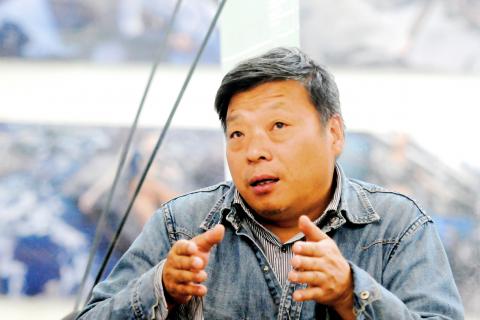Lu Guang’s (盧廣) photographs exposed the everyday realities of people on the margins of Chinese society: coal miners, drug addicts, HIV patients. Now, the award-winning photographer is at the center of his own stark story.
Lu was taken away by state security agents three weeks ago for unknown reasons, his wife, Xu Xiaoli (徐小莉), told reporters late on Tuesday.
Lu was traveling in Xinjiang on Nov. 3 when she lost contact with him, Xu said.

Photo: Reuters
He had connected with photographers one week before in Urumqi and was scheduled to meet a friend in Sichuan Province on Nov. 5, but he never showed up, she said.
A friend of Xu helped her inquire about her husband’s whereabouts in his home province of Zhejiang, where authorities said that Lu and a fellow photographer had been taken away by Xinjiang state security.
They did not give any further details, the friend told Xu.
“I know that he wouldn’t have done anything illegal,” Xu, 45, said in a telephone interview from New York City, where she is studying art design and raising their child.
Xinjiang’s propaganda department did not immediately respond to a faxed request for comment.
When asked about Lu during a regular briefing yesterday, Chinese Ministry of Foreign Affairs spokesman Geng Shuang (耿爽) said he was not aware of the situation.
Lu won first prize in the World Press Photo contest for a series on poor Chinese villagers who became infected with HIV after selling their own blood to eke out a living.
His photos tackle gritty subjects, such as pollution and industrial environmental destruction — issues traditionally avoided by the Chinese press because they risk punishment for exposing societal problems that the government might consider sensitive.
However, Lu never had problems with the police before, Xu said, adding that she was not aware of any photography projects he had planned for his Xinjiang trip.
“He has a strong sense of social responsibility,” she said. “He believed, after confronting the faces of the destitute, that there were things that people should know. At the very least, he believed that [his photos] might motivate them to help others, to trigger change and make things better.”
Lu’s profile on the World Press Photo Web site says he is the recipient of numerous other photography honors, including Germany’s Henri Nannen Prize in Photography and a National Geographic Photography Grant.
Lu was the first photographer from China to be invited by the US Department of State as a visiting academic, it said.
Xu said she believes it was Lu’s first visit to Xinjiang.

CHIPMAKING INVESTMENT: J.W. Kuo told legislators that Department of Investment Review approval would be needed were Washington to seek a TSMC board seat Minister of Economic Affairs J.W. Kuo (郭智輝) yesterday said he received information about a possible US government investment in Taiwan Semiconductor Manufacturing Co (TSMC, 台積電) and an assessment of the possible effect on the firm requires further discussion. If the US were to invest in TSMC, the plan would need to be reviewed by the Department of Investment Review, Kuo told reporters ahead of a hearing of the legislature’s Economics Committee. Kuo’s remarks came after US Secretary of Commerce Howard Lutnick on Tuesday said that the US government is looking into the federal government taking equity stakes in computer chip manufacturers that

NORTHERN STRIKE: Taiwanese military personnel have been training ‘in strategic and tactical battle operations’ in Michigan, a former US diplomat said More than 500 Taiwanese troops participated in this year’s Northern Strike military exercise held at Lake Michigan by the US, a Pentagon-run news outlet reported yesterday. The Michigan National Guard-sponsored drill involved 7,500 military personnel from 36 nations and territories around the world, the Stars and Stripes said. This year’s edition of Northern Strike, which concluded on Sunday, simulated a war in the Indo-Pacific region in a departure from its traditional European focus, it said. The change indicated a greater shift in the US armed forces’ attention to a potential conflict in Asia, it added. Citing a briefing by a Michigan National Guard senior

POWER PLANT POLL: The TPP said the number of ‘yes’ votes showed that the energy policy should be corrected, and the KMT said the result was a win for the people’s voice The government does not rule out advanced nuclear energy generation if it meets the government’s three prerequisites, President William Lai (賴清德) said last night after the number of votes in favor of restarting a nuclear power plant outnumbered the “no” votes in a referendum yesterday. The referendum failed to pass, despite getting more “yes” votes, as the Referendum Act (公民投票法) states that the vote would only pass if the votes in favor account for more than one-fourth of the total number of eligible voters and outnumber the opposing votes. Yesterday’s referendum question was: “Do you agree that the Ma-anshan Nuclear Power Plant

ENHANCED SECURITY: A Japanese report said that the MOU is about the sharing of information on foreign nationals entering Japan from Taiwan in the event of an emergency The Ministry of Foreign Affairs yesterday confirmed that Taiwan and Japan had signed an agreement to promote information exchanges and cooperation on border management, although it did not disclose more details on the pact. Ministry spokesman Hsiao Kuang-wei (蕭光偉) said the ministry is happy to see that the two nations continue to enhance cooperation on immigration control, in particular because Taiwan and Japan “share a deep friendship and frequent people-to-people exchanges.” “Last year, more than 7.32 million visits were made between the two countries, making it even more crucial for both sides to work closer on immigration and border control,” he said. Hsiao